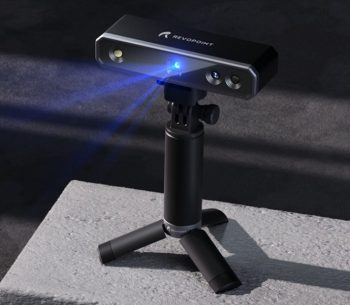
Revopoint MINI makes 3D scanning affordable and accessible to everyone
Creating 3D models in the past used to be a very difficult and laborious process that not only required big and bulky equipment, but it was also very expensive. The size of these 3D scanning machines also made it difficult to transport, meaning that users were kind of limited to where they could use it.
Thankfully, technology has advanced leaps and bounds over the years to the point where 3D scanning technology has managed to be shrunken down and made more portable. A good example would be the Revopoint MINI, a handheld 3D scanner that is small enough to fit into your bag, letting you take it with you wherever you go and create 3D models on the fly.
Why create 3D models?
This is great not just for people who are looking to sell products, but it can also be useful for hobbyists. Imagine being able to scan yourself and then creating a miniature figurine for your Dungeons & Dragons or Warhammer sessions. Or what if you needed to prototype something on the fly and need to create a particular component? By scanning a real-world object, you can then print it out and use it to test your creation.
What can you use the Revopoint MINI for?
The creators of the Revopoint MINI also suggest that the device could be used for academic purposes, where if you need to scan objects that are hundreds or thousands of years old, being able to bring the scanner with you instead of moving the object into the scanner can help preserve it.
There are also potential medical applications to the Revopoint MINI, where you can use it to scan and capture facial or body data in mere seconds. This might be useful for procedures where the doctor or surgeon needs to have this type of patient data, like for reconstructive or cosmetic surgery.
It can also have industrial use, where if you need to perform quality inspections on a product, using the Revopoint MINI will let you scan a component to collect surface data on it so that you can ensure that tolerances are within acceptable levels and so on.
Revopoint MINI features
That being said, we should point out that modern-day smartphones like the iPhone actually come with LiDAR sensors that can help with 3D scanning, so some of you might be wondering isn’t it better to just use our phones?
The Revopoint MINI is also equipped with a scanner that has a precision of 0.02mm, which is pretty damn accurate. This is key if you’re looking to make 3D models that need to be extremely precise whether it be for a product or medical prosthetic.
In addition to being highly precise, the projection technology used in the Revopoint MINI is pretty fast too. According to the creators of the Revopoint MINI, it can capture 3D data of an engine cylinder in ten minutes or less, with high density of point clouds with a 0.05mm point distance.
This is expected to be able to save users 80% of the time and cost reverse engineering something the old fashioned way.
Crowdfunding on Kickstarter
So, if you think that the Revopoint MINI is something that you could use for your own projects, or maybe you’re curious about 3D scanning and want to try it out yourself without spending too much money, the device is currently on Kickstarter raising funding.
At this time of writing, it has managed to raise over $1.7 million, blowing past its original goal of $12,741, so head on over to its Kickstarter page if you’d like to pledge your support.